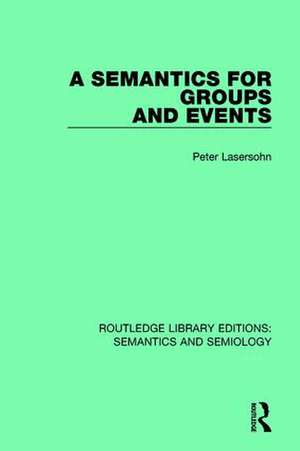A Semantics for Groups and Events: Routledge Library Editions: Semantics and Semiology
Autor Peter Lasersohnen Limba Engleză Hardback – 4 oct 2016
| Toate formatele și edițiile | Preț | Express |
|---|---|---|
| Paperback (1) | 356.44 lei 6-8 săpt. | |
| Taylor & Francis – 27 feb 2018 | 356.44 lei 6-8 săpt. | |
| Hardback (1) | 625.03 lei 6-8 săpt. | |
| Taylor & Francis – 4 oct 2016 | 625.03 lei 6-8 săpt. |
Preț: 625.03 lei
Preț vechi: 942.63 lei
-34% Nou
Puncte Express: 938
Preț estimativ în valută:
119.60€ • 125.21$ • 98.96£
119.60€ • 125.21$ • 98.96£
Carte tipărită la comandă
Livrare economică 08-22 aprilie
Preluare comenzi: 021 569.72.76
Specificații
ISBN-13: 9781138690905
ISBN-10: 1138690902
Pagini: 156
Dimensiuni: 156 x 234 mm
Greutate: 0.45 kg
Ediția:1
Editura: Taylor & Francis
Colecția Routledge
Seria Routledge Library Editions: Semantics and Semiology
Locul publicării:Oxford, United Kingdom
ISBN-10: 1138690902
Pagini: 156
Dimensiuni: 156 x 234 mm
Greutate: 0.45 kg
Ediția:1
Editura: Taylor & Francis
Colecția Routledge
Seria Routledge Library Editions: Semantics and Semiology
Locul publicării:Oxford, United Kingdom
Cuprins
Preface; Chapter I: Adverbial Modification and the Interpretation of Distributive Predicates; 0. A few preliminaries 1. The distributive-collective dichotomy 2. "Intrinsic" distributives and collectives 3. Distributive predication as predication on groups 4. Group-sensitive adverbials 5.Conjoining collective and distributive verb phrases; Chapter II: Group Action and Spatio-Temporal Proximity; 0. Introduction 1. Vagueness and Ambiguity 2. The "proximity" uses if group-sensitive adverbials 3. Semantic effects of adverbial position 4. Quantifier scope 5. Event structure and group action 6. Fragment 2 7. Examples 8. Locative and temporal readings 9. Adjectival and object-oriented readings 10. Distributive predicates revisited 11. Conclusion; Chapter III: The Algebra of Groups and the Algebra of Events; 0. Introduction: Tightening up the model 1. The algebra of groups 2. A note on respectively constructions 3.Committees, etc. 4. The algebra of events as a semilattice 5. Restricting the structure of events 6. Unaugmented and augmented frames; Chapter IV: Quantifiers. Group-Level Properties and Agreement; 0. Are quantifiers sensitive to event structure? 1. Different types of group-level events 2. Event-sensitive quantification 3. Additivity, inclusion and exclusion 4. An argument-restriction account of agreement 5. Some problems 6. Agreement and the inclusion/exclusion distinction 7. Distributive determiners and plural agreement 8. Fewer than two and more than one 9. Remaining problems; References
Descriere
First published in 1990, this dissertation presents an event-based model-theoretic semantics for plural expressions in English. The author defends against counterarguments the hypothesis that distributive predicates are predicates of groups, and not just individuals. By defining the collective/distributive distinction in terms of event structure, he solves formal problems with previous group-level analyses. The author notes that certain adverbials have a systematic ambiguity between a reading indicating collective action, and readings indicating spatial or temporal proximity; the event-based definition of collective action makes possible a parallel treatment of these readings.















